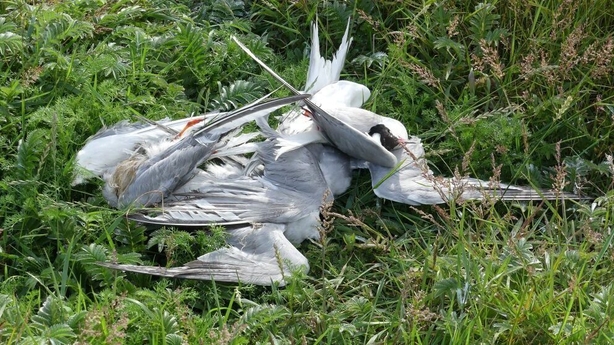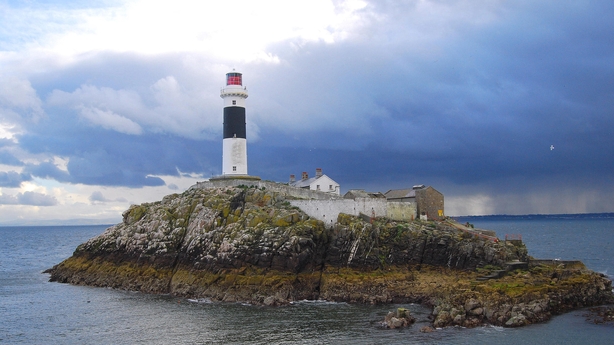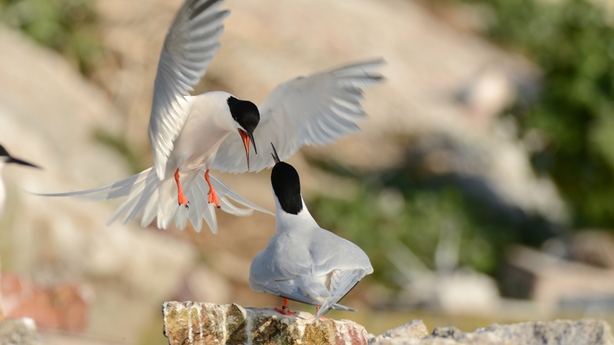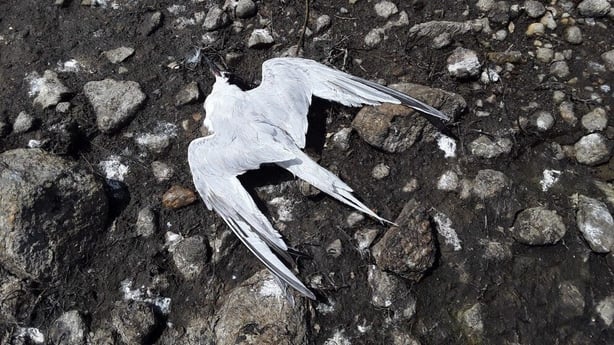BirdWatch Ireland has said its staff are dealing with "alarming and unprecedented" outbreaks of bird flu, also known as H5N1 and avian influenza.
It said the carcasses of hundreds of dead seabirds, both adults and chicks, have been recovered for disposal over the past few weeks, amid efforts to try to prevent further spread of the highly contagious viral disease.
"It's been very gruesome," explained Dr Stephen Newton, BirdWatch Ireland's Senior Seabird Conservation Officer.
"Our job can be about bird monitoring, ringing and all the exciting things, but at the moment it's really just corpse collection, wearing hazmat suits and the works. It's very unpleasant."

During the current nesting season, the hardest hit birds have been members of the tern family, a group of migratory seabirds which visit Ireland each summer to breed.
BirdWatch Ireland said more than 160 adult Common Terns, along with over 450 Common Tern chicks, have been found dead at the breeding colony at Lady's Island Lake, Co Wexford, with the disease now also threatening the populations of Sandwich Terns and Roseate Terns that also nest there.

It said a small number of adult Common Terns were also found dead or dying on Rockabill Island, off the coast of Dublin.
Carcasses from Rockabill sent to the Department of Agriculture, Food and the Marine for analysis tested positive for bird flu.
Rockabill is Europe's largest and most important breeding colony for Roseate Terns, holding 1,750 pairs.
BirdWatch Ireland said an outbreak of bird flu in this colony would have "disastrous" repercussions at an international level.

Dr Newton said: "About ten days ago, we started to get dead birds on Rockabill. Initially, it was just common terns, but now there are roseates too. Numbers have crept up from one or two dead birds a day, to ten a day.
"We fear it could go pear-shaped on Rockabill very quickly. It is our worst-case scenario.
"We don't have a daily boat there, so we are trying to work out what to do with all the dead birds on the island.
"The department has given us several containers which they would use on commercial chicken farms, if there's an outbreak there.
"My job today is to get this stack of barrels out to the island, to start filling them up. We'll then have to ship them off for incineration in the coming days."
Dr Newton said there is also an outbreak of bird flu in the tern colony in Dublin Port.
"Last week we picked up 30-40 common terns there. I had a crew out there yesterday and it has escalated there too.
"It's a huge, huge headache. In all these colonies, all we can hope is that some birds have some resistance and will survive, so they can rebuild," he said.

Meanwhile, the HSE is reminding people not to handle or touch sick or dead wild birds to protect themselves from bird flu.
The Director of the HSE Health Protection Service, Dr Eamonn O’Moore, said: "Although it is very unusual for people to catch bird flu, it can happen.
"We are advising people not to pick up or touch dead or sick wild birds, and to keep their pets away from them.
"Bird flu is a type of influenza that affects birds and while it is rare that humans can become infected, it can cause serious disease. Bird flu is not human to human transmissible.
"People should also avoid contact with surfaces contaminated with bird faeces and should not handle bird feathers they find in the wild."
Anyone who comes across dead or sick wild birds is asked to notify the Department of Agriculture, Food and the Marine via the Avian Check App or call the Avian Influenza Helpline Number (076) 1064403 or 1850 2000456.







